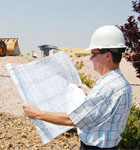Though D. Wayne Klotz took an unexpected path to get to where he is today, he had always planned on owning an engineering firm. “I thought I’d work my way into ownership of an existing company, but I had [two choices]: the security of staying a middle manager or the opportunity to fulfill a dream, so I took a deep breath and took the plunge,” recounts Klotz. That plunge was the purchase of the business that would become Klotz Associates, Inc. in 1985. Today, the company is one of Houston’s most respected civil engineering firms. Klotz himself has accumulated numerous awards, including being named the 2011 Texas Engineer of the Year. However, Klotz’s definition of success is different: “Twenty-seven years later, we’re still here,” he says.
What attracted you to engineering?
My father was an engineer, so I had a pretty good feel for what the job involved, and thought it would be an attractive career path for me.
How did you get into the field?
I received a bachelor’s degree in civil engineering from Texas A&M University in 1974, and went to work for a private engineering consulting firm, but felt that I needed a master’s degree to achieve my goals. I considered an MBA, but ultimately decided to pursue a master’s degree in civil engineering while taking business-oriented electives. For two years, I worked all day and went to school all night. I’m glad I did that when I was young.
What made you want to start your own business?
I always knew I wanted to end up in engineering management, and as a young professional, anytime I had a chance to take a course, I chose the management side over the technical side. I thought I’d grow into my abilities and one day join the ownership of a company I was working in, but, in 1985, I was presented with an opportunity to purchase an established company that was in some financial difficulties. My father and I purchased it in 1985.
Did you change anything about the company?
Everything. I’d been practicing for 11 years and had a strong sense of what I thought would make a good company. I began by installing some strong core beliefs, including integrity, high quality, and pursuit of excellence. I’ve always sought to challenge myself and my people to excel at all we do. I tell my people all the time, “I don’t wake up in the morning aspiring to mediocrity.”
What strategies do you attribute to your company’s success?
We allow people to work at their highest level and reward them if they do. We don’t have a rule that you have to be here so many years to have a certain position. If you demonstrate skills, you can move as high in the organization as rapidly as you’re capable. We’re also equitable. At the end of the year, if we have profits, everyone in the company gets a piece based on performance.
Externally, what are your success strategies?
We don’t try to be all things to all people. I’m not out there trying to build power plants; we focus on what we’re good at, which is public infrastructure and commercial and institutional land development. I’ve also always said marketing is important. We set a high budget for it and put our most senior people in the marketplace to sell. This is still a personal business—companies sign contracts, but people do projects.
I understand that you believe in balance. Why is this philosophy so important to you?
We’re very family-oriented. I’m still married to the lady I married in 1974, and we have four children, and now grandchildren, so I raised my family while I was here. I wasn’t willing to sacrifice my marriage for the success of my business. This company is what I do, not who I am. I work hard to make sure our folks have the same experience. My philosophy is work hard while you’re here, then go home, and when you’re home, do something else.

